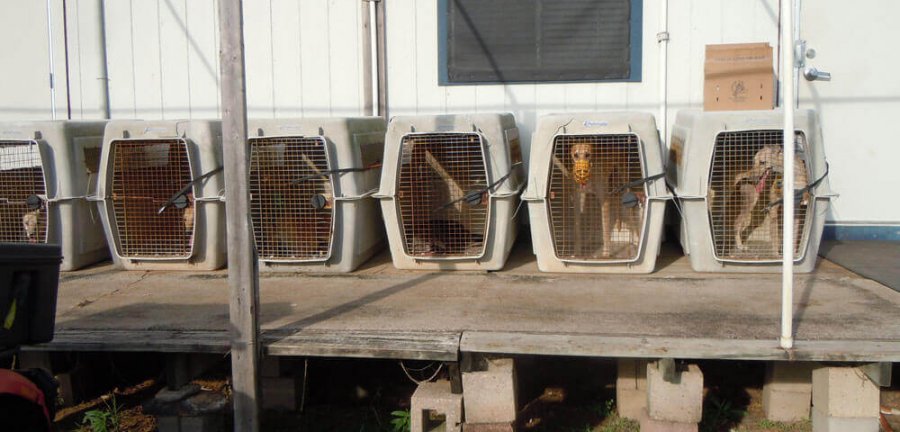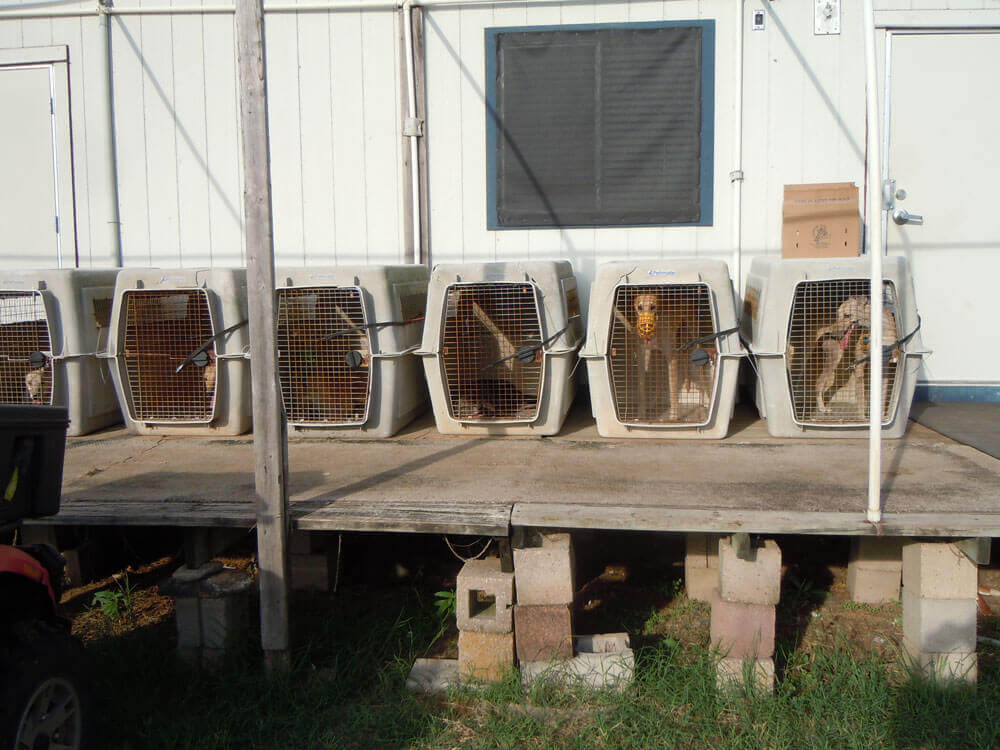Even people who are engaged and involved in animal rights issues may not have heard of the industry that PETA recently exposed: greyhound blood banks. After being discarded from the racing industry, many of these sensitive and gentle dogs are relegated to a miserable existence as “donors” so that their blood can be sold to veterinary practices across the country.
Thanks to a kind and courageous whistleblower, 151 greyhounds who were imprisoned at a filthy Cherokee, Texas, blood farm known as The Pet Blood Bank, Inc., have been rescued.
The dogs were warehoused 24 hours a day, seven days a week, in wire kennels in an old outdoor shed, with nothing to do but wait to be dragged out repeatedly with a homemade catchpole so that their blood could be extracted.
After PETA exposed The Pet Blood Bank’s actions, the public reaction was swift. More than 145,000 people contacted Patterson Companies, Inc.—the parent company of the corporation that distributed the blood to veterinary clinics across the U.S.—to urge it to use its resources to secure lifetime care for the dogs. The company’s Facebook page was bombarded with comments, and the video regarding the matter on PETA’s Facebook page was viewed more than 600,000 times. We ran mobile billboards that circled the blood bank owner’s hometown and Patterson’s headquarters. Armed with signs, PETA supporters also surrounded Patterson’s headquarters and paid a visit to the home of the company’s president at the time, James Wiltz. We also purchased one share of stock in the billion-dollar enterprise in order to put pressure on management.
PETA pal Paul McCartney sent a letter to Patterson urging it to step up and help rescue the dogs. “I have had dogs since I was a boy and loved them all dearly,” he wrote. “I join my friends at PETA in asking you to pay these greyhounds back, and to let them retire from the dirt-floored, barren conditions in which they are kept isolated and alone.”
Thanks @PaulMcCartney for speaking out! Retweet if you want Patterson Companies to help greyhounds farmed for blood.https://t.co/D4Z0zy0JwT pic.twitter.com/lP6f0gSVIT
— Peace Begins on Your Plate ☮ Go Vegan (@peta) October 11, 2017
It wasn’t long after this onslaught that The Pet Blood Bank closed its doors and the dogs were released for placement in real homes.
Even an attorney for the blood farm acknowledged that the business’s closure was because PETA’s campaign had “caused our long-standing customer relationships to be terminated.”
Now these special dogs are getting the care that they need. But most importantly, they finally have the opportunity to live as dogs should—playing, enjoying the company of other dogs, and having guardians who care about them.
But why was this allowed to happen in the first place? Saving some dogs’ lives shouldn’t mean creating misery for others. Blood transfusions for dogs are relatively rare, so humane, community-based blood banks can meet the needs of dogs in critical condition.
Ask veterinarians to look into the source of any blood that they purchase, and urge them not to buy blood from factory farms, where dogs are bled repeatedly throughout their lives.
There is no federal regulation of these facilities, and in Texas, no state authority inspects or licenses any animal blood bank. These hidden places operate under the radar—something that PETA is working to change as a result of this exposé.
If you think that this win is impressive, just wait until you see what comes next … stay tuned.






